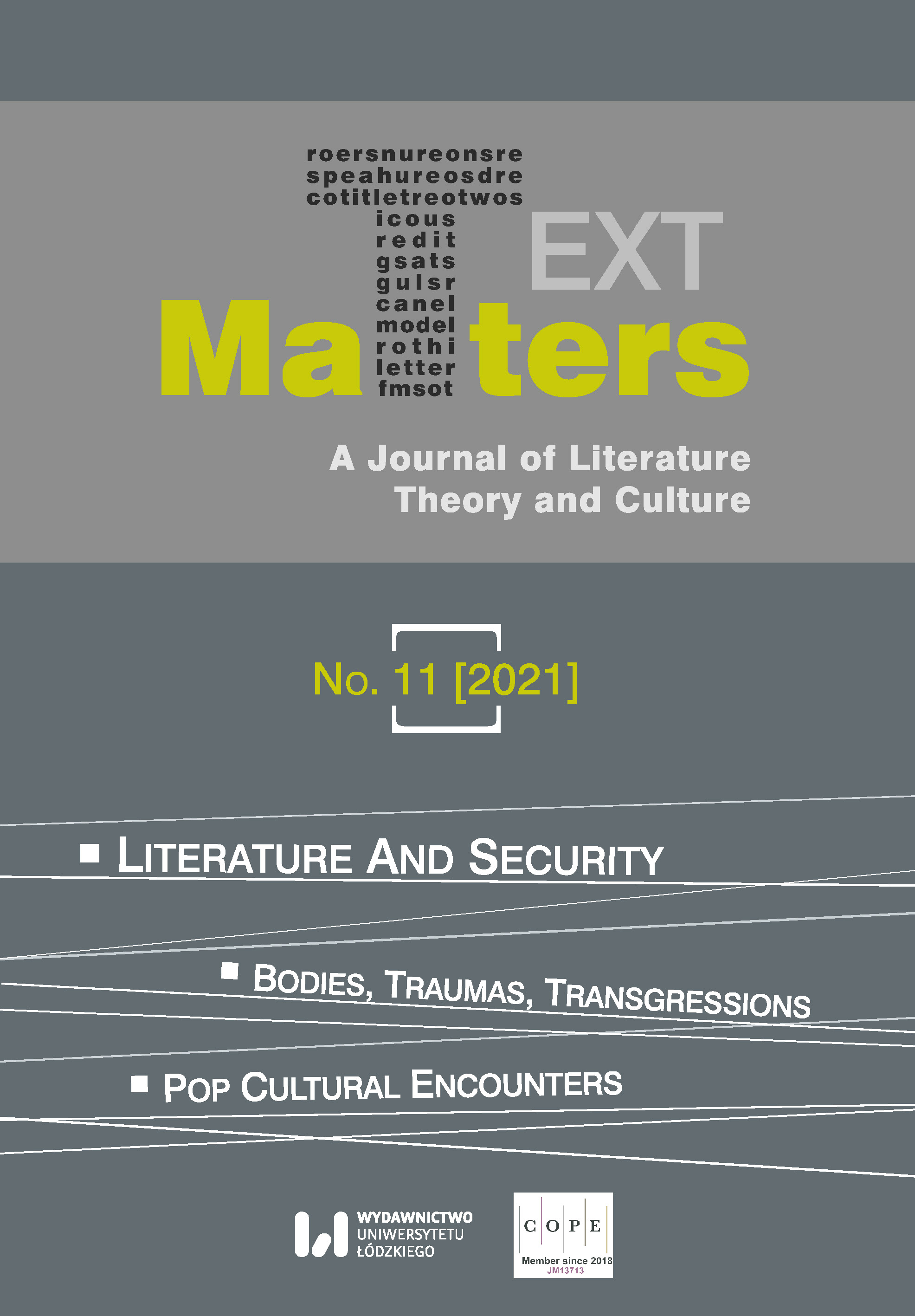“. . .delivered from the lie of being truth”: The Affective Force of Disinformation, Stickiness and Dissensus in Randy Ribay’s Patron Saints of Nothing
DOI:
https://doi.org/10.18778/2083-2931.11.06Keywords:
affective feedback loops, stickiness, dissensus, Randy Ribay, Patron Saints of NothingAbstract
Waged in 2016, Philippine President Rodrigo Duterte’s war on drugs has claimed over 20,000 lives according to human rights groups. The Duterte administration’s own count is significantly lower: around 6,000. The huge discrepancy between the government’s official count and that of arguably more impartial organizations about something as concretely material as body count is symptomatic of how disinformation is central to the Duterte administration and how it can sustain the approval of the majority of the Philippine electorate. We suggest that Duterte’s populist politics generates what Boler and Davis (2018) call “affective feedback loops,” which create emotional and informational ecosystems that facilitate smooth algorithmic governance. We turn to Patron Saints of Nothing, a recently published novel by Randy Ribay about a Filipino-American who goes back to the Philippines to uncover the truth behind the death of his cousin. Jay’s journey into the “heart of darkness” as a “hyphenated” individual (Filipino-American) allows him access to locally networked subjectivities but not its affective entanglements. Throughout the novel, he encounters numerous versions of the circumstances of Jun’s demise and the truth remains elusive at the end of the novel. We argue that despite the constant distortion of fact and fiction in the novel, what remains relatively stable or “sticky” throughout the novel are the letters from Jun Reguero that Jay carries with him back to the Philippines. We suggest that these letters can potentially serve as a form of “dissensus” that challenges the constant redistribution of the sensible in the novel.
Downloads
References
Adorno, Theodor. Minima Moralia: Reflections on a Damaged Life. Translated by E. F. N. Jephcott. Verso, 2005.
Google Scholar
Ahmed, Sara. The Cultural Politics of Emotion. Edinburgh UP, 2014. https://doi.org/10.4324/9780203700372
Google Scholar
DOI: https://doi.org/10.4324/9780203700372
Ahmed, Sara. The Promise of Happiness. Duke UP, 2010. https://doi.org/10.1215/9780822392781
Google Scholar
DOI: https://doi.org/10.1515/9780822392781
Balod, Hon Sophia, and Michael Hameleers. “Fighting for Truth? The Role Perceptions of Filipino Journalists in an Era of Mis- and Disinformation.” Journalism, 2019, pp. 1–18. https://doi.org/10.1177/1464884919865109
Google Scholar
DOI: https://doi.org/10.1177/1464884919865109
Boler, Megan, and Elizabeth Davis. “The Affective Politics of the ‘Post-truth’ Era: Feeling Rules and Networked Subjectivity.” Emotion, Space and Society, vol. 27, 2018, pp. 75–85. https://doi.org/10.1016/j.emospa.2018.03.002
Google Scholar
DOI: https://doi.org/10.1016/j.emospa.2018.03.002
De Chavez, Jeremy, and Asha Varadharajan. “‘Been Down So Long It Looks Like Up to Me’: Rethinking the Humanities (in Times of) Crisis.” Critical Arts, vol. 33, no. 3, 2019, pp. 46–58. https://doi.org/10.1080/02560046.2019.1665693
Google Scholar
DOI: https://doi.org/10.1080/02560046.2019.1665693
Diaz-Fernandez, Silvia, and Adrienne Evans. “Lad Culture as a Sticky Atmosphere: Navigating Sexism and Misogyny in the UK’s Student-centred Nighttime Economy.” Gender, Place & Culture, vol. 27, no. 5, 2020, pp. 744–64. https://doi.org/10.1080/0966369X.2019.1612853
Google Scholar
DOI: https://doi.org/10.1080/0966369X.2019.1612853
Dressel, Björn, and Cristina Regina Bonoan. “Southeast Asia’s Troubling Elections: Duterte Versus the Rule of Law.” Journal of Democracy, vol. 30, no. 4, 2019, pp. 134–48. https://doi.org/10.1353/jod.2019.0057
Google Scholar
DOI: https://doi.org/10.1353/jod.2019.0057
Elemia, Camille. “Army Captain Named as Operator of Fake Facebook Accounts.” Rappler.com, 23 Sept. 2020, https://www.rappler.com/technology/philippine-army-soldiers-operating-fake-facebook-accounts accessed 7 Oct. 2020.
Google Scholar
Gearon, Liam, and Marion Wynne-Davies. “Literature and Security: CIA Engagement in the Arts. What Philosophers of Education Need to Know and Why.” Journal of Philosophy of Education, vol. 52, no. 4, 2018, pp. 742–61. https://doi.org/10.1111/1467-9752.12333
Google Scholar
DOI: https://doi.org/10.1111/1467-9752.12333
Gleicher, Nathaniel. “Removing Coordinated Inauthentic Behavior.” Facebook, 22 Sept. 2020, https://about.fb.com/news/2020/09/removing-coordinated-inauthentic-behavior-china-philippines/ accessed 6 Oct. 2020.
Google Scholar
Gündoğdu, Ayten. “Disagreeing with Rancière: Speech, Violence, and the Ambiguous Subjects of Politics.” Polity, vol. 49, no. 2, 2017, pp. 188–219. https://doi.org/10.1086/691190
Google Scholar
DOI: https://doi.org/10.1086/691190
Human Rights Watch. “World Report 2020.” Human Rights Watch, 2020, https://www.hrw.org/world-report/2020/country-chapters/philippines#23ace2 accessed 7 Oct. 2020.
Google Scholar
Lema, Karen. “Philippines’ Duterte Renews Threat to Kill Drug Dealers after Big Bust.” Reuters, 5 June 2020, https://www.reuters.com/article/us-philippines-drugs/philippines-duterte-renews-threat-to-kill-drug-dealers-after-big-bust-idUSKBN23C0E3 accessed 5 Oct. 2020.
Google Scholar
Ong, Jonathan Corpus, and Jason Vincent A. Cabañes. Architects of Networked Disinformation: Behind the Scenes of Troll Accounts and Fake News Production in the Philippines. ScholarWorks@UMass Amherst, 2018, https://scholarworks.umass.edu/cgi/viewcontent.cgi?article=1075&context=communication_faculty_pubs accessed 5 Oct. 2020.
Google Scholar
Pulse Asia Research. “September 2020 Nationwide Survey on the Performance and Trust Ratings of the Top Philippine Government Officials and the Performance Ratings of Key Government Institutions.” Pulse Asia Research Inc., 22 Sept. 2020, http://www.pulseasia.ph/september-2020-nationwide-survey-on-the-performance-and-trust-ratings-of-the-top-philippine-government-officials-and-the-performance-ratings-of-key-government-institutions/ accessed 3 Oct. 2020.
Google Scholar
Rancière, Jacques. Dissensus: On Politics and Aesthetics. Translated and edited by Steven Corcoran. Continuum, 2010. https://doi.org/10.5040/9781472547378.ch-001
Google Scholar
DOI: https://doi.org/10.5040/9781472547378.ch-001
Rancière, Jacques. The Politics of Aesthetics: The Distribution of the Sensible. Translated by Gabriel Rockhill. Continuum, 2004.
Google Scholar
Ribay, Randy. Patron Saints of Nothing. Penguin Random, 2019.
Google Scholar
Talabong, Rambo. “PH Intel Chief Shares Fake Information on Facebook.” Rappler.com, 30 Sept. 2020, https://www.rappler.com/nation/philippines-intelligence-chief-monteagudo-regular-sharer-fake-information-facebook accessed 7 Oct. 2020.
Google Scholar
Tanner, Claire, et al. “‘Sticky’ Foods: How School Practices Produce Negative Emotions for Mothers and Children.” Emotion, Space and Society, vol. 33, 2019, pp. 1–8. https://doi.org/10.1016/j.emospa.2019.100626
Google Scholar
DOI: https://doi.org/10.1016/j.emospa.2019.100626
Tolia-Kelly, Divya P. “Rancière and the Re-distribution of the Sensible: The Artist Rosanna Raymond, Dissensus and Postcolonial Sensibilities within the Spaces of the Museum.” Progress in Human Geography, vol. 43, no. 1, 2019, pp. 123–40. https://doi.org/10.1177/0309132517739141
Google Scholar
DOI: https://doi.org/10.1177/0309132517739141
Tomacruz, Sofia. “Duterte Threatens to Stop Facebook in the Philippines.” Rappler.com, 28 Sept. 2020, https://www.rappler.com/nation/duterte-threatens-stop-facebook-philippines accessed 7 Oct. 2020.
Google Scholar
Zembylas, Michalinos. “The Affective Grounding of Post-truth: Pedagogical Risks and Transformative Possibilities in Countering Post-truth Claims.” Pedagogy, Culture & Society, vol. 28, no. 1, 2020, pp. 77–92. https://doi.org/10.1080/14681366.2019.1598476
Google Scholar
DOI: https://doi.org/10.1080/14681366.2019.1598476
Published
How to Cite
Issue
Section
License

This work is licensed under a Creative Commons Attribution-NonCommercial-NoDerivatives 4.0 International License.













